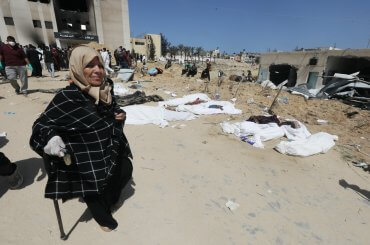I went to the demonstration against Netanyahu in a police pen near the Council on Foreign Relations in New York City last Thursday and talked with Nancy Kricorian of Code Pink about the Palestine Festival of Literature this spring, where she read from a novel she had written about the Armenian genocide.
Kricorian said that as she read she got very emotional. She’d spent the previous week seeing the West Bank for the first time. She met a girl who showed her a deep bruise on her thigh from a soldier slamming his rifle butt into her leg when she refused to remove her clothes in order to be searched at a checkpoint. She went through the Qalandiya checkpoint several times, she went through the Bethlehem checkpoint, which she had heard described as the "Lambs to the Slaughter,” and whose steel chutes had made her feel like livestock. The mood of her novel was so charged with the overwhelming violence of the occupation that she kind of lost it.
Later an American who lives in Israel came up to her and said, "You seemed to be getting pretty emotional up there." "Yes," she said, "well after what we’ve seen this last week, it’s extremely upsetting." The American said, "When you live out here you get used to it." Kricorian stared at him with her jaw open. And he said, “I was joking.”
Kricorian told me she didn’t know which was worse, to get used to it or to make a joke about it.
She said the Palestinians also get used to it, to the downright ongoing thievery of the situation, and the oppressive bureaucracy of the checkpoints, and then certain things shock them and are widely discussed. A ten-year-old girl had been stopped at a metal detector because she had an artificial leg. The soldiers had made her take her leg off in front of them, and they further insisted that she disrobe. The girl was thoroughly humiliated, and the story was flying around among Palestinians, with horror and anger.
At the same time as the Palestine Festival of Literature there was a Jerusalem literature festival with David Grossman reading and Paul Auster, Siri Hustvedt, Jonathan Safran Foer and Nicole Krauss. Ethan Bronner, who wrote a piece for the Times about the two festivals, suggested that they should all get together. But PalFest organizer Ahdaf Soueif explained to him that the Palestinian writers on the festival bus wouldn’t be allowed entry to West Jerusalem.
Some of the most pitiable stories Kricorian had heard involved the denial of basic rights, the rights to travel and speak and even to think, to Palestinians. A scholar in Bethlehem said that her dissertation had come to an end because it was about 19th Century Christian missionaries’ travel narratives of the Holy Land and for some reason she got put on a blacklist and so she wasn’t allowed into Jerusalem. All the books she needed for her research were in a restricted library in Jerusalem only four miles from her house, but she couldn’t read them. Then a young man with literary ambition told Kricorian that all his friends just want to write about the occupation, that’s their material after all, their donne, but he’s afraid to write, because Israeli soldiers have come into his house and thrown his papers and books up in the air, and what if they come in and find he is writing about the occupation, he could go to jail or get on a list so that he can’t travel??
Then Kricorian talked about the apartheid analogy. A PalFest participant from South Africa had been stunned while visiting the West Bank because she said it was far worse than what South Africa had been like under apartheid. Another South African PalFest writer had said the current level of violence by Israel’s government was reminiscent of the last days of apartheid.
And this is the part that gives Kricorian hope. The current Palestine solidarity movement is a lot like the 80s during the anti-South Africa divestment movement that she took part in. I asked Kricorian about the power politics– the hasbara, and the Jewish community organizations. Kricorian said this scene too is changing. The Beinart piece was huge, and even the New York Times/Bronner takeout on tax-deductible gifts to settlements showed a sea change beginning in the mainstream coverage of the issues.
Kricorian blogged about the festival here.

